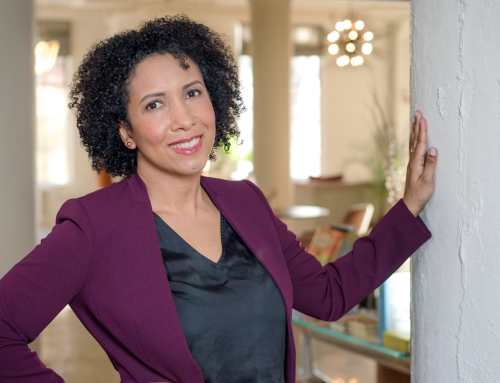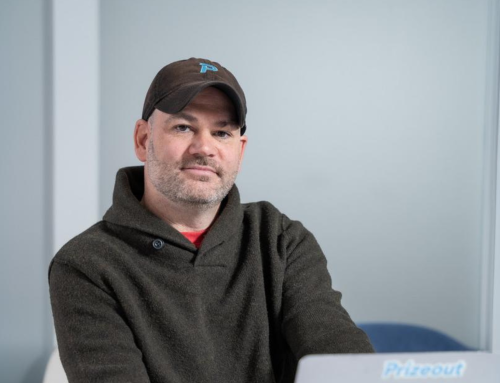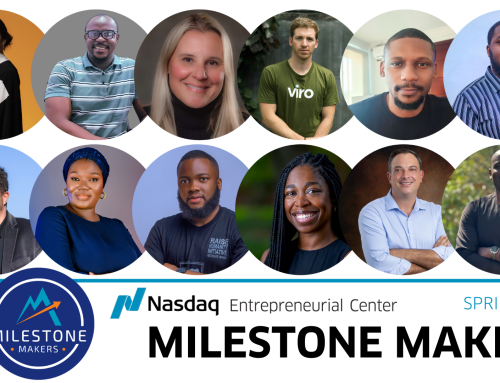Jessica Matthews founded her company when she was just 22 years old. Uncharted Power, an award-winning renewable power compan. Its partners are able to get the power they need through vehicular and pedestrian traffic, all while saving 20% or more on their electricity bill. The technology and products are designed to be integrated into roads, sidewalks, buildings, with huge potential to save energy, and the environment. For instance, over 25,000 lbs in CO2 emissions are avoided annually for each installed MORE SpeedBump. The Nasdaq Entrepreneurial Center took a moment to catch up with Matthews to find out more about her journey as an entrepreneur so far.
JM: I think what’s really exciting is that a lot of people feel like there’s a pattern to entrepreneurship that usually if you come from a family that’s wealthy or you come from a family where people look a certain way, then it’s easier to get into that space. But, what was interesting for me, and something that helped me get through some of the tougher times in running the company was actually having a slightly different background than most CEOs in the tech space. Whether it’s coming from Poughkeepsie, or being the daughter of immigrants, or being a black woman – all of these things have presented circumstances which added some degree of uncertainty to my own life growing up. But it’s the ability to be comfortable with this uncertainty that gives me the strength for running a company. Entrepreneurship is 100% owning and living in uncertainty and I’ve found that this wasn’t something that shook me as much as others that I knew. For those that have always had really comfortable experiences and haven’t really experienced struggle in their lives, the struggle of being an entrepreneur can be something that really turns them upside down.

The SOCCKET ball by Uncharted Power
How did your company come to be? (describe the a-ha moment to lead to its conception)
JM: Uncharted Power is a renewable-energy company that creates microgenerator energy systems that can be scaled to power large infrastructure systems such as streetlights, Wi-Fi hot-spots, and off-grid electricity power packs. Starting first with an energy generating soccer ball, I built a company that would provide a platform for energy innovations both large and small. But in order to start the company, I had to be a leader in addition to being a dreamer. That meant making a solid business plan, building a team and raising money from venture capitalists in a world I barely understood. I walked into rooms filled with people who looked nothing like me. The world I was entering was white, straight, and male. At first, I worried that these investors would never understand me. We don’t even laugh at the same things. Like it or not, these kinds of nuances are critically important when you are thinking about giving your money to someone, and investors often invest in people who look and sound like them. That is not good news for black women or anyone else who does not match the classic “Silicon Valley pattern”. Digital Undivided did a groundbreaking study titled “Project Diane” that showed that out of 10,238 venture deals closed between 2012 and 2014, only 24 of these deals were closed with a black female founder or co-founder. In addition, only eleven startups founded by black women have raised more than one million dollars in venture capital. Eleven! As “Project Diane” puts it, black women are the real tech unicorns
So how did I raise the money I needed in that environment? At first, I felt pressure to change myself–to change how I spoke and existed to attempt to “blend” into this world: to “code switch” permanently. However, I understood from the beginning that I couldn’t pretend that I was just like the VC guys—not even for a minute. Successful start-ups need investment partners who will stand by them and what they represent. Companies have ups and downs, so when you are thinking about your investors, as a black woman you might wonder, “How can I ensure they’ll support me during those lows when they don’t fully understand where I come from and how I plan to deal with these lows?” My “a-ha” moment was in realizing that while investors trend toward the familiar, what they are looking for in these familiar places is something that is impactful and authentic. Impact and authenticity are at the core of Uncharted Power. So yes, we could code switch and try to play down the things that make us different, but the investors that were truly fit to help us scale would want us to double down on the things that define and differentiate us. Raising money is rarely easy, especially for minority groups, but it is possible to do it effectively if you remind yourself that you are enough–in fact, you are more than they could have ever dreamed.

Barack Obama plays with the Soccket as Jessica O. Matthews watches at the Ubungo Power Plant in Dar es Salaam, Tanzania on July 2, 2013
That’s really powerful. What’s the biggest experience or lesson gained on your journey so far?
JM: I personally don’t believe that any one company or person can solve the world’s problems. Instead, we need systems that recruit different types of people to give different perspectives that can benefit the growth strategy of any business. People from various communities should embrace this advantage of being able to look at situations in a new way, because this is smart business.
How is your company changing the landscape?
JM: I think it’s very exciting to take an ethos about not just the technology itself, but the way people should interact with technology and how it should benefit the world. Our MORE (Motion-based, Off-grid, Renewable Energy) technology is what’s in the soccer ball and jump ropes, but it’s also in the new infrastructure products we are building. It’s really exciting to think about how to take the Uncharted Power ethos, starting with a soccer ball, and scale it to infrastructure systems that can affect people around the world in really expansive ways.
But I’m also really excited that we haven’t lost who we are as a company in this whole process. The more that we grow, the more we’re able to suggest that it’s not just the tech that’s new, but the way we build this tech and the way how companies that build technology, in general, should look. And that’s a big thing for me. As a woman of color, it’s really important that we think about diversity not as charity, but as something that’s good for business. So knowing that we are setting that example and suggesting an alternative is part of the overall technological revolution, is something that really, really excites me.
Lastly, I’m excited about taking thoughts and psychological ethos and applying it to technology. I’m excited to see how individuals react to what we’re building and how this affects their thoughts and their lives. Our mission is to democratize energy access. I think we live in a world right now where people sometimes don’t feel like their voices are equally heard or that their voices matter. So there’s something really inspiring to building technology that not only works on providing individual agency, but does so in a way that is scalable. I think the key to our technology is that we’re able to create these microgenerators and efficiently combine them in a way that really produces a very loud voice, both literally and figuratively.
What do you wish you knew when you started? Is there anything you would do differently?
JM: There’s always so many different challenges, that it’s hard to choose just one. But the general theme around most of the challenges are problems that you don’t know are going to be problems until you’re in the thick of the situation. Anything that you can see coming, you can plan. It’s the things that you would have never expected to bubble up and mess you up, but then afterward they feel so obvious are the things that you have to try and overcome. On one hand, it’s not so bad because when you do overcome them I think you learn the lesson even better than if you had just been aware, read a book and avoided it. You really understand why this makes sense. You become a better teacher for others. It also definitely shows you what you’re made of when you have to get through those things. So, I think the biggest challenge is just kind of when you don’t know what you don’t know.
Specifically, one of the most significant lessons I’ve in my work with Uncharted Power are the challenges surrounding supply chain. No one ever talks about supply chain, for example, and how important it is to really understand supply chain when you want to make a good product. They talk about the invention process. They talk about the scale. But no one talks about logistics. No one talks about the things that aren’t sexy about entrepreneurship and invention, one of the main ones being supply chain.
So what advice/credo do you live by as you grow the business?
JM: Whenever you feel like the ‘other’ walking into a space, and attempting to be successful, it can be a very interesting balance of being vigilant and also attempting not to be paranoid, and I think that’s something that I definitely faced throughout the round. There were times when I felt like “Why would anyone want to listen to me?”. “Do they even believe me?” And I had these feelings and fears because I am so different from what the norm is in Silicon Valley.
Sometimes I would find people who I could not be more opposite from, and they could not be more excited about me because they could recognize that I had the grit and that I had the vision to build something amazing. However, at other times, and with other people I was meeting with, I was exactly right about my fears. I remember in one specific meeting with a V.C. despite the fact that they were told that I’m the technical lead, despite the fact that they were told that I was the inventor of our flagship product, the reps from the VC in the room kept asking questions as if the technical lead wasn’t in the room. It even got to the point where someone on my team actually got upset. Fortunately, the managing director of the fund, who also happened to be a black woman, felt quite embarrassed and actually scolded her team member in front of everyone. So even in those scenarios when your own boss is a black woman, it doesn’t take away the subconscious biases that individuals have, and the role of said biases when they’re trying to make decisions about investment. Overall though I definitely felt like there is a world and culture around investment and venture right now. And it’s a world that doesn’t really fit me. It doesn’t mean that they’re not welcoming. However it does mean that to exist there, I would have to code switch quite a bit and ultimately become something that I’m not today. And so I personally made the decision that no matter what happens with my startup, I want to make sure I know who I am when I start and that I know and like who I am when I’m finished. I have decided to be very authentic in terms of my perspective, my culture, my personality, as a black woman of the African Diaspora, and finding people who want to work with that. And so in raising the round, moving to Harlem, working in Africa, hiring a very diverse team, and doing business with diverse people, I feel very confident and very happy to say that it is possible to raise money and it’s possible to be successful and still be authentically one hundred percent a black woman.
What’s it like to work your team? And what advice do you have for fellow entrepreneurs about scaling and leading teams?
JM: Entrepreneurship to me is really about thinking divergently, and about being okay with being uncomfortable and with the unknown. I believe that discomfort breeds innovation and innovation comes from thinking outside of the box. Entrepreneurship is about innovation and taking chances on things that other people may think are crazy, and sometimes that is uncomfortable.
I’m a woman, I’m black, and I’m running a hardware tech company in NY. In order for us to be in Silicon Valley, we would have to code switch. My life experiences have led me to where I am right now and I want to be in an environment where I can embrace that. How you are different is actually a competitive advantage and not an obstacle. If people don’t fit in at the table in Silicon Valley, then we should create our own table.
Well said. And where do you find inspiration when faced with challenges?
JM: Well, the stakes are always a little bit bigger when you are starting something on your own. But ultimately I have nothing to lose and everything to gain if I keep going. I was fortunate to start this young and I’m fortunate to still be young and have achieved some success. And as long as I still feel like I’m making an impact and as long as I feel like I’m really challenging myself and growing, I’ll keep going. I see no reason why I would do something that would ever remove my opportunities to really show the world who I am and what I can do, and honestly show myself who I am and what I can do.
What does “success” look like for you? What do you think will help you achieve it?
JM: I really got into the energy space not necessarily to solve energy problems but because it was intriguing to me that no one thought there could be a solution. With my company, I wanted to see how far we could push this so that people could see that they have more agency and we could do more than the status quo. Overall, I think that success is a world where people do not believe that the energy status quo is inevitable and is the only solution available. And the way to accomplish this is to not only present solutions that take care of this gray area, but that makes people feel that they are a part of the solution. So success is really figuring out how far we need to scale this technology in a manner that allows as many people as possible to jump on the bandwagon and believe that this is possible.
Many entrepreneurs continue to perfect their daily routines to support their work and greater vision; would you mind sharing your morning routine or a regular ritual that grounds your work each day?
JM: Every morning, Monday through Friday, I try to get in a workout, which is usually boxing or weightlifting. I usually aim to get my workouts in early because you really cannot control what happens after 9 am. Then I set my to-do list for the day, and I always make my list longer than what I can accomplish. Afterward, I shower, and do emails.
Has being a black female entrepreneur helped or discouraged you in your context? What do you think would help female entrepreneurs and leaders the most?
JM: Many view being a black woman to be an obstacle in entrepreneurship, but I view it as a competitive advantage. Ultimately, entrepreneurship is problem-solving. Often, entrepreneurs are simply solving their own problems and are fortunate enough to share problems with large enough groups that a market for a sustainable business is created. As a black person and a woman, I feel I have a competitive advantage as an entrepreneur because the majority of the world looks like me, and yet so few of our problems have been solved. This means I have a huge opportunity to build meaningful things and have a massive impact on our global society. When you’re a member of a “less-overlooked” group, that opportunity isn’t there.




Invite a Friend
Close